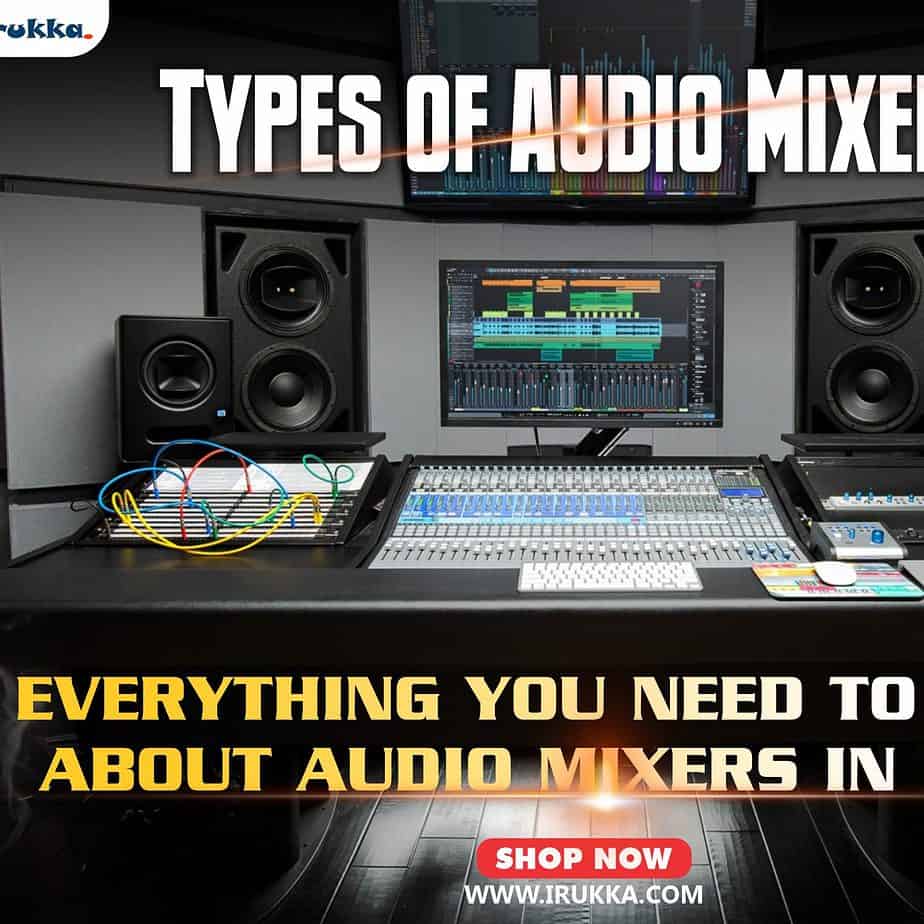Types of Audio Mixers -Everything You Need To Know in 2023
Types of Audio Mixers | Everything You Need to Know About Audio Mixers in 2023
What are audio mixers?
There are several types of audio mixers, including:
- Analog Mixers: These mixers use analog circuits to process audio signals. They are known for their warm and natural sound and are often used in recording studios and live sound applications.
- Digital Mixers: These mixers use digital processing to manipulate audio signals. They offer more precise control and a wider range of features than analog mixers, including the ability to store and recall settings.
- Rack-Mount Mixers: These mixers are designed to be mounted in a rack and are often used in professional audio applications such as recording studios and live sound reinforcement.
- Portable Mixers: These mixers are lightweight and compact, making them easy to transport. They are commonly used by musicians, small churches, and other groups that need to set up and tear down quickly.
- In-Line Mixers: These mixers are placed inline with the audio signal path and are typically used in live sound reinforcement and broadcasting applications.
- Mixing Console: This type of mixer is typically found in professional studios and live sound applications, the mixing console is a large-format mixer that offers a wide range of inputs and outputs, as well as advanced features such as equalization and dynamics processing.
What are hybrid mixers?
What are studio mixers?
What are powered mixers?
Powered mixers are audio mixers that have built-in power amplifiers. This means that the audio signals from the mixer are amplified before being sent to the speakers, eliminating the need for separate power amplifiers. Powered mixers are commonly used in live sound reinforcement and are popular with bands, DJs, and other performers who need a compact and portable audio setup. They are also used in small venues, churches, and other locations where space is limited. Some of the advantages of using a powered mixer include ease of setup, flexibility, and cost-effectiveness. They are also equipped with different features such as the ability to store and recall settings, multiple inputs and outputs, and the ability to process audio signals in real-time.
How do I choose a mixer?
When choosing an audio mixer, there are several factors to consider:
- Number of channels: Consider how many inputs you will need to accommodate all of your audio sources.
- Type of mixer: Decide whether you need an analog, digital, or hybrid mixer based on your specific needs.
- Features: Consider what specific features are important to you, such as EQ, compression, reverb, and the ability to store and recall settings.
- Connectivity: Make sure the mixer has the appropriate number of inputs and outputs for your needs, and check for compatibility with other equipment such as recording interfaces and PA systems.
- Size and portability: Consider whether you will be using the mixer in a fixed location or if you need something that is easy to transport.
- Budget: Determine your budget and choose a mixer that fits within that budget while still providing the features and functionality you need.
- Quality: Always check for the mixer’s sound quality, which should be transparent, precise and with a low noise floor.
- Brand reputation: Consider the reputation of the brand, and read reviews from other users to get an idea of the mixer’s performance and reliability.
- Support: Consider the support offered by the manufacturer or seller, such as warranty and customer service.
By taking these factors into consideration, you will be able to choose an audio mixer that meets your specific needs and provides the best possible sound quality.
How much is a sound mixer in Nigeria?
It’s important to note that the price of sound mixers can be affected by various factors such as exchange rates, taxes, and import costs, so the prices may fluctuate. Additionally, the price of a sound mixer may also vary depending on the location within Nigeria. It’s always advisable to research and compare prices from different retailers, both online and physical, to get the best deal.
The Presonus 32Sx Digital 32 channel Mixer is a well-known option among users and its pricing falls between 1.8 million to 2.7 million Naira. For those seeking a portable and cost-effective alternative, the PreSonus StudioLive 16.0. 2 USB is a suitable option. It is sold at a price range between 550,000 and 600,000 Naira.







